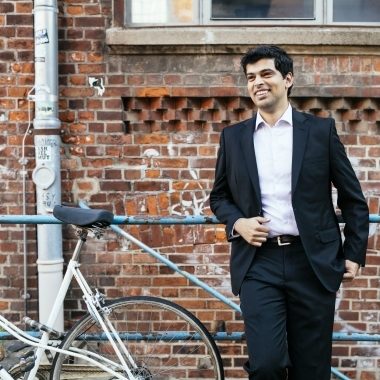INCOMINGS
Exchange students welcome
Each year around 100 exchange students come from our partner universities to spend their term abroad at HHL. The students represent more than 30 countries and make HHL a place where different cultures come together and thrive on extensive interaction with each other. They are a valuable part of our community, who not only contribute to the high international composition of our classes but also bring valuable insights into their cultures, adding to the knowledge set students take upon leaving HHL. We hope to have you as part of our exchange program and look forward to welcoming you in Leipzig.
Students from selected partner universities also have the possibility to participate in an additional degree program between their home university and HHL, for either the M.Sc. or the MBA degree. If you are interested in this option, you will need to fulfill HHL´s regular admission requirements for the respective degree. To learn more about the program, please see the section “Additional Degree”.
Courses
Exchange students may choose courses from the full-time M.Sc. or the full-time MBA program.
All courses at HHL are taught in English.
List of M.Sc. Courses
- Problem Solving & Communication
- Ethics and Sustainability
- Economics
- Oraganizational Behavior
- Financial Analysis & Modelling
- Disruptive Technologies & Business Models
- Competiteveness
- Entrepreneurial Finance
- Value Chain Management
- Entrepreneurship
- Negotiation
- International Macroeconomics
- Managerial Decision Making
- Coding & Data Literacy
- Global Strategy
- Corporate Valuation & M&A
- Financial Instruments & Asset Pricing
- Innovation Management & Corporate Entrepreneurship
- Online Marketing & Customer Analytics
- Growth Management
- Stakeholder Communication
- Capital Market Theory & Investments
- Risk Management of Corporations
- Change Management
- Customer Value Creation
- Business Plan Seminar
- Advanced Corporate Finance
- Case Study Seminar with Finance Executives
List of MBA Courses
- Problem Solving & Communication
- Business Strategy
- Corporate Finance
- Marketing
- Economics
- Financial Accounting & Reporting
- Social Entrepreneurship, Sustainability, Society & You
- Negotiation
- Advanced Corporate Finance
- Business Ethics
- Circular Economy
- Entrepreneurship
- Corporate Strategy
- Managerial Decision Making
- Big Data Analytics
- International Marketing Simulation
- Corporate Valuation & M&A
- Business, Environment, Society & Leadership
- Cost Accounting
- Organizational Behavior
- Logistics
- Macroeconomics & the Global Economy
- Innovation Management & Corporate Entrepreneurship
- Managing Global Corporations
- Leading High Performance Teams
- Public Relations & Crisis Communication
- Applied Corporate Finance
- Disruptive Technologies & Business Models
- Change Management & Stability
- Quantitative Managerial Techniques
- Mindful Leadership
- Value Chains in the Digital Age
- Entrepreneurial Finance
- Risk Management
- Online Marketing & Customer Analysis
- New in the Leadership Role & Human Resources
Regulations
Workload
For foreign exchange students our recommended workload is 20 ECTS credits per quarter.
The minimum workload expected is 15 ECTS credits; the maximum is 30 ECTS credits.
Language of instruction
The language of instruction is English.
Course restrictions
MBA students coming for an exchange term may take courses from the MBA program and from the M.Sc. program. Courses in the MBA program may be restricted to exchange students coming from a MBA program at their home institution. HHL reserves the right to decide individually according to specific requirements such as pre-knowledge and work experience, whether students from other programs are eligible for MBA courses as well. Students coming from consecutive programs (usually a 4- or 5-year European program leading to an equivalent of a Master’s degree) are welcome in the M.Sc. program.
Exams
Once registered for a course you must attend the exam. The only reason for taking an exam at a later date is a certified illness verified by a sworn medical officer (Amtsarzt).
For regular treatments (not during exams) please see the list of doctors in Leipzig.
| German System | ECTS System | Explanation |
|---|---|---|
| ≤ 1,1 | A (best 10%) | outstanding |
| ≤ 1,4 | B (next 25%) | very good |
| ≤ 1,7 | C (next 30%) | good |
| ≤ 2,3 | D (next 25%) | satisfactory |
| ≤ 4,0 | E (next 10%) | pass |
| > 4,0 | Fx | fail (second exam allowed) |
| > 4,0 | F | fail (second exam not allowed) |
| P | Grades not awarded |
The percentages within the ECTS system (European Credit Transfer System) are calculated on the basis of all (19.509) exams in the period September 2014 – August 2019.
Academic Calendar
Important Note:
For exchange students not coming from the European Union or the United States, we recommend an application no later than three months before the beginning of the preparatory course (processing time for issuing a student visa at the embassy).
Fall term 2025
- April 1, 2025: Application deadline for non-US and non-EU exchange students
- June 1, 2025: Application deadline for US and EU exchange students
- Term: September 1 – December 21, 2025, incl. exams and orientation
Winter term 2026
- September 1, 2025: Application deadline for non-US and non-EU exchange students
- October 1, 2025: Application deadline for US and EU exchange students
- Term: January 5 – March 15, 2026, incl. exams and orientation
Spring term 2026
- November 1, 2023: Application deadline for non-US and non-EU exchange students
- December 1, 2023: Application deadline for US and EU exchange students
- Term: March 9 – June 28, 2026, incl. exams and orientation
Summer term 2026
- March 1, 2026: Application deadline for non-US and non-EU exchange students
- April 1, 2026: Application deadline for US and EU exchange students
- Term: June 29 – September 6, 2026, incl. exams and orientation
Fall term 2026
- April 1, 2026: Application deadline for non-US and non-EU exchange students
- June 1, 2026: Application deadline for US and EU exchange students
- Term: August 31 – December 20, 2026, incl. exams and orientation
Spring and fall terms include a one and two-week preparation session for incoming exchange students.
Formalities Before Arrival
Here you can find useful information about what to do before your arrival in Germany. Click on the blue bars to learn more about visa requirements, health insurance, opening a bank account and housing options for your studies at HHL Leipzig Graduate School of Management.
Please be aware that processing time for a student visa might take up to three months. Application deadlines for our programs are fixed to allow students enough time for their visa process and on time arrival. Please note, HHL is unable to speed up the processing time for the visa.
Important: Do NOT apply for a tourist visa. We are not allowed to accept it and it cannot be changed into a residence permit. We are unable to accept latecomers!
Visa Requirements
EU citizens maintaining a passport from the following countries do not require a visa, but need to go to the city registration office after arrival:
Austria, Belgium, Bulgaria, Croatia, Cyprus, Czech Republic, Denmark, Estonia, Finland, France, Greece, Hungary, Ireland, Italy, Latvia, Lithuania, Luxemburg, Malta, The Netherlands, Poland, Portugal, Romania, Sweden, Spain, Slovak Republic, Slovenia; other countries of the EEA (Iceland, Liechtenstein, Norway) and Switzerland.
Non-EU citizens
Citizens of the following countries do not require a visa, but need to apply for the residence permit at the foreigners’ office after arrival. Furthermore, they need to go to the city registration office after arrival: Australia, Canada, Israel, Japan, Korea (South), New Zealand, USA
Citizens of the following countries do not require a visa, but are not allowed to work during or after the program at HHL without a visa, so visa application is highly recommended. They will need to apply for the residence permit at the foreigners’ office after arrival. Furthermore, they need to go to the city registration office after arrival:
Andorra, Brazil, El Salvador, Honduras, Monaco, San Marino
Required documents
You will need to provide the following documents to the embassy:
- Application form for a national (type D) visa for study purposes (3 copies)
- 4 passport sized photos
- Visa fee (can be waived for students)
- Letter of acceptance
- Financial proof of a minimum of EUR 934 per month (academic year 2022/23). This is for living costs during your stay in Germany. In case you have a document about an official scholarship for your studies at HHL (governmental scholarships only, e.g. DAAD) you can use this as proof of your living costs.
- Travel health insurance with coverage of a minimum of EUR 30,000. This insurance should be effective from the start of the program at HHL.
Erasmus+ Learning Agreement
Erasmus+ exchange students coming to HHL must use the Online Learning Agreement (OLA). This will be implemented at HHL by the start of the academic year 2021/22 and is valid for Erasmus exchange students coming from program countries. In case other students need a learning agreement, please use the paper version, provided by your home institution.
How to prepare and approve your OLA
- Prepare your OLA after you have been accepted as a student at HHL and after you have signed up for your courses in study.hhl.de (beginning December for January/March; beginning February for March/June; beginning July for September/December).
- Fill out your OLA and sign it online. You may login with your academic credentials (only in case your university is using EDUgain, typically you will have an eduroam account) or with a Google account (data will be forwarded to learning-agreement.eu) or in some countries with EIDAS (you must have an identity card valid for electronic services)
- Your home university will automatically receive a notification by e-mail to sign your OLA once you have signed it.
- We (HHL) will automatically receive a notification by e-mail to sign your OLA once your home university has signed it.
- Once HHL has signed it, your OLA is complete.
- Download the Erasmus+ App to track your OLA and other useful information.
Details to fill in your OLA
Step 1: Student information
- Academic year: 2021/2022
Step 2: Sending institution
- Make sure the email address of your contact person is correct.
Step 3: Receiving institution
- Receiving institution name: HHL Leipzig Graduate School of Management (D LEIPZIG09)
- Faculty/department: International Relations
- Receiving responsible person at HHL: Friederike Solga, Manager International Relations; friederike.solga@hhl.de
- Receiving Administrative Contact Person: not necessary
Step 4: Proposed Mobility Programme
- Academic year: 2021/2022
- Planned start of the mobility: see the academic calendar on this page
- Planned end of the mobility: see the academic calendar on this page
- Table A: Study programme at the receiving institution: list the courses you will take at the host institution (Component codes and number of ECTS credits at HHL: Course List)
- Table B: Recognition at the sending institution: list the courses at your home university that will be substituted
Step 5: Commitment
- Make sure that you sign your OLA. It is only when you have signed it that the coordinator at your home university will be able to sign it. The signature field works best on touch screen, but you can also sign your OLA using a regular computer and pointer/mouse. Your home university will then receive your OLA by email from the Erasmus Dashboard.
During mobility
It is also possible to adjust the OLA during the mobility period if your home university requires this. Sign in to the OLA system and fill out the section under New learning agreement with changes. This section can only be filled out if your original OLA (Before the mobility) is complete and signed by you, your home university and HHL.
Opening a Bank Account
German Consulates are allowed to request to open a blocked account in Germany for proof of your living costs. In this case, you should open an account, e.g. Deutsche Bank Hamburg. Use the form given on their website and sign it in presence of the visa officer.
With your signature, your account is blocked in favor of the Federal Republic of Germany, and you may withdraw EUR 934 per month from it. In all other cases, we suggest opening a German bank account after your arrival in Leipzig.
Housing
In some cases, the embassy will ask you for an address for your stay in Germany. As soon as you have your official letter of acceptance, you should start searching for an accommodation in Leipzig. You could, for instance, apply for an accommodation in the dorms of the Leipzig Student Union (Studentenwerk Leipzig) or look for private accommodation on the internet.

Formalities after Arrival
Orientation Week
All international students coming to HHL will have one mandatory orientation week. The orientation includes:
- Bureaucracy Issues (City Registration, Residence Permit, Bank Account)
- Course regulations and enrollment
- Introduction of our IT, Library, Career Service and Marketing departments
- Introduction of the chairs including course description
- Intercultural Introduction
- Introduction to Leipzig
City registration
After finding accommodation, you have to register within the first two weeks of your stay at one of the offices of the City Hall. Their offices are located in all parts of the city. All students have to present the following form together with a confirmation of the landlord for their apartment and their passport (or for EU citizens alternatively: Identity Card).
German Bank Account
It is highly recommended to open a bank account in Germany for the duration of your stay. You may open a bank account at a bank of your choice. Some institutes offer special conditions for students. The Foreigner’s Office might ask you to open a blocked account for your stay in Germany (EUR 934 per month). In this case you must open an account.
Residence Permit
Student Union Fee
Each student has to pay a fee to the local student union. This fee has to be paid to HHL and HHL is obliged to transfer the money to the student union. The fee is Euro 235,00 and includes the free usage of Leipzig’s public transport system also in the surrounding areas of Leipzig, the usage of the cafeterias around the campus and the student dorms.
A waiver of the mandatory fee is possible only in cases where the student is absent from Leipzig for a period of at least six months. The student union will decide based on the written application (in German) of the individual student.
Working
EU citizens
Students from countries which are part of the EEA countries have the right to work in Germany.
Non-EU citizens
With some exceptions, non-EU-citizens must apply for a work permit (exceptions see below). Permission will be granted in case the central employment office certifies after a priority review that no nationals from EEA countries are available for the same job.
Exceptions
A) Access to the labor market as a student:
In case your residence permit shows that you are “allowed to work 120 days full-time or 240 days part-time” you may work during 120 days with a minimum of 4 hours/day (=full-time) or 240 days with a maximum of 4 hours/day (=part-time) without any restrictions during a period of 360 days.
Salaries for the exceptions described in A) are not limited.
B) Highly qualified employees (for graduates):
A definition of “highly qualified” is given by the German Foreigners Act. It is defined by the annual salary. In case you receive more than EUR 53,600 per year (for 2019), there will not be a priority review.
Internships for Exchange students
In case of a nomination of your home university you may stay for an internship in Germany, provided you have passed a prior first semester as an exchange student at HHL. Your nomination must show that an internship is a required part of your study program. German knowledge is an important asset for an internship in Germany.
Travelling
Travelling (short stay – tourist)
Non-EU students need a visa to enter Germany, see information about Visa Issues. In most cases this is a national (type D) visa, valid for Germany and the Schengen states. This visa is the basis to apply for a residence permit. For this permit you must apply before the visa expires (usually within the first 90 days of your stay).
With the residence permit (or with a D visa) you are allowed to travel within the Schengen states.
These countries are: Austria, Belgium, Czech Republic, Denmark, Estonia, Finland, France (without: French Guiana, Guadeloupe, Martinique, Réunion), Greece (without Athos), Hungary, Iceland, Italy, Latvia, Lithuania, Luxembourg, Malta, The Netherlands, Norway, Poland, Portugal, Sweden, Switzerland, Slovakia, Slovenia, Spain (without Ceuta and Melilla).
For all other countries you might need a visa.
Second Degree
The option for a second degree requires a separate agreement between HHL and the partner university.
Regulations
Incoming students seeking a second degree usually take the regular study program at their home university and earn 60 ECTS credits at HHL. The master thesis must be written at the home university. The final transcripts will be handed out to the student by the home university after completing both programs.
For courses please refer to the Courses section above. Please make sure to only choose courses from the program you are intending to achieve an additional degree.
Please note: It is not possible to earn credits for
- Master thesis
- Internships
- Study abroad
- Language courses
Application
You have read all provided information and are now ready to start your application process?
Learn more about how to apply and what you need to provide for your studies at HHL.
Application deadlines
- For EU/US citizens: 3 months prior the requested start of the exchange period
- For non-EU citizens: 4 months prior the requested start of the exchange period
Academic requirements
- Average ECTS credits/term: 20 credits
- Minimum ECTS credits/term: 15 credits
- Maximum ECTS credits/term: 30 credits
- Fluency in English is mandatory
- German at survival level recommended (not required)




